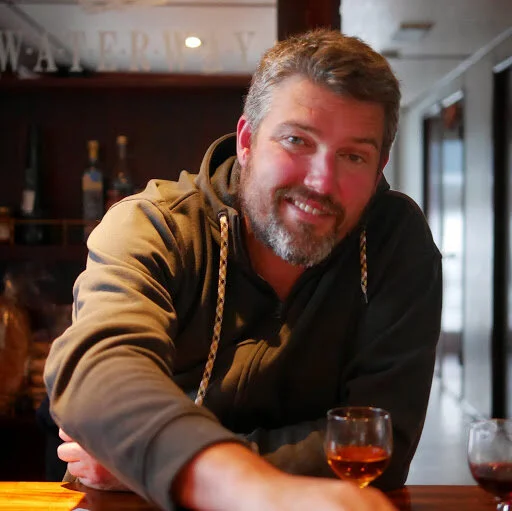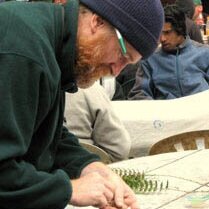Associates
Stella Asaha
Stella is the coordinator, and a staff researcher, at Forests, Resources and People FOREP, a Cameroon-based non-profit organization. She is a social forester with a research background in rural livelihoods, food security, and non-timber forest products. Stella has a strong interest in engaging and training young people in rural development and natural resource management, and has mentored many students from the University of Buea and elsewhere over the years.
Jenne de Beer
For the last four decades, Jenne has worked with forest dwelling indigenous communities, mostly in Southeast Asia. His work has focused on a broad range of matters relating to sustainable use and rights over forest resources. Together with an exceptional team, he is collaborating with People and Plants on the cultural revival and empowerment of the Negritos of The Philippines. This work is undertaken in partnership with the Negrito communities’ national umbrella organization Sentrong Pagpapalakas ng Negritong Kultura at Kalikasan, Inc. SPNNK.
Rosa Canelos
Rosa is from the Ancestral Commune of Canelos and member of the Pastaza Kichwa nation in Ecuadorian Amazon. She runs the Gender and Territory Program at the Sacha Warmi foundation, which she founded with Didier Lacaze. Rosa supports groups of indigenous women to restore traditional ceramic-making, and promote the cultivation and use of medicinal and food plants. For the last 15 years, she has also run a small initiative, Florasana, that produces herbal medicines and natural products.
Lynn Clayton
A zoologist by training, Lynn has worked for the last two decades with an Indonesian team to conserve the Nantu Forest in northern Sulawesi, Indonesia. Around 8,000 people, most small farmers, live outside the Nantu Wildlife Sanctuary. Lynn and the team are working with communities to support sustainable livelihoods, including cocoa production and cattle farming. This work also involves close collaboration with local schools, and hosting stakeholder learning visits to Nantu, to raise awareness.
Jon Corbett
Jon is a community-based researcher interested in the use of digital multimedia by remote and marginal communities to document, store, manage and communicate their culture, language, history and traditional ecological knowledge. Jon has worked with communities in Australia, Indonesia, the Philippines and, over the past six years, with First Nations and Aboriginal communities in British Columbia. He is an associate professor in the Department of Community, Culture and Global Studies Unit at UBC Okanagan, and director of ICER, the Institute for Community Engaged Research.
Annette Dingha
Annette is a forest agronomist currently working with local communities around the Mount Cameroon Region. Her work seeks to enhance food security, improve forest rehabilitation, and mitigate the effects of climate change. She is a Culture Hack Lab fellow working to reinvent food production systems as a way of supporting the cultural diversity of communities, and their relationship to land.
Claudette Dingha
Claudette holds a Master of Law (LLM) degree in Human Rights and Development from the University of Buea. The focus of her work is community development and social justice, and she is an advocate for maternal, sexual and reproductive health rights for vulnerable groups in Cameroon. Claudette also works with local communities to ensure gender inclusion in policies for environmental protection around the Mount Cameroon region.
Patricia Gerez
Patricia is a biologist and forester based at the Universidad Veracruzana, specializing in community forestry. She collaborates with SENDAS, A.C and its program on the Pixquiac river basin, working with smallholders on environmental services projects to support forest management and conservation. She collaborates with Steering Committee Member Citlalli López in a long-term study on traditional agroforestry systems with management for wood energy in the Sierra de Zongolica, Veracruz. She participates in a network of technical advisers on issues of public policy and management options, promoted by the civil organization ERA, A.C. ResearchGate
Myles David Jewell
Freelance filmmaker and content creator, Myles runs Pennington Productions and works independently on both feature documentaries and narrative films. Myles earned a Master of Arts in Cinema Studies from New York University and an Advanced Certificate from The Program in Culture and Media. He teaches a course on documentary for social change and community based cinema at the University of Vermont. Myles believes firmly in the ethics of representation and collaborative approaches to media production.
Didier Lacaze
Didier Lacaze is a consultant specializing in Amazonian traditional medicine, shamanism and medicinal plants. He has over thirty five years of experience working on indigenous health care programs with regional and national indigenous organizations in Amazonian Peru and Ecuador. He currently runs a program on intercultural health with the Sacha Warmi foundation, of which he is a founder, and also works with the kichwa people of Pastaza region on the vital importance of how nature and culture connect to create harmony through sound in Ecuadorian Amazon.
Ruth Malleson
Ruth’s work and research interests focus on rural livelihoods, natural resource management, poverty alleviation, well-being and rural development, particularly in the humid forest zones of West and Central Africa, Southeast Asia and the rangelands of Southern Africa. She currently works part-time as Planning, Monitoring and Evaluation Coordinator in Ghana and Kenya for the UK Space Agency International, and as a Senior Results-Oriented Monitor (ROM) for the European Union. ResearchGate
Elias Ndive
Elias has worked since 1996 with the Limbe Botanic Garden, where he is currently developing a guide to useful plants of Mt Cameroon and managing the Herbarium. He has worked on dozens of forest inventories and plant collecting projects across Cameroon, Equatorial Guinea, the Republic of Congo, and Republic of Guinea, and with conservation and research groups including the Smithsonian Institution, DFID, and GIZ.
Alan Pierce
Alan is an independent researcher specializing in forest policy, subsistence use of forests and ecological literacy. His research includes that on contemporary gathering traditions in Vermont and reasons for their persistence or decline. Over the past 15 years, Alan has worked as a consultant for a number of international NGOs and agencies, creating policy frameworks for the sustainable harvest and trade of non-timber forest products. He is a long-term collaborator of People and Plants, and has worked on several People and Plants manuals.
José Antonio Sierra
Ecologist and forester, with a concentration in tropical conservation and development, José uses various disciplinary lenses and biocultural approaches to study and improve forest management in Mexico and beyond. His current interests range from community forest management and governance, forest-agriculture interfaces, tourism as a driver of biodiversity consumption, to environmental justice, particularly the recognition of traditional ecological knowledge in the context of forest management and ecological restoration. ResearchGate
Mary Stockdale
Adjunct Professor in the Department of Community, Culture and Global Studies at the University of British Columbia’s Okanagan campus, Mary teaches and conducts research related to sustainability, the environment and natural resource management. She has had 20 years of experience working in Southeast Asia on community-based management of forests and non-timber forest products (NTFP), working with the NTFP-Exchange Programme for South and Southeast Asia. She is presently focused on activities in her own region of the North Okanagan in BC, Canada, working on sustainability initiatives such as community engagement in climate action, and building stronger regional food systems.
Rachel Wynberg
Based in the Department of Environmental and Geographical Science at the University of Cape Town, Rachel holds a South African Research Chair focused on Environmental and Social Dimensions of the Bio-economy. Her research focuses on bio-politics, the commercialization and trade of biodiversity, access and benefit sharing, and wider questions about governance, livelihoods, rights to resources and traditional knowledge. She also has a strong interest in agroecology and alternative agricultural futures. ResearchGate
















